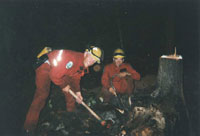Night shift contributes to lung cancer
The scientific nutty idea that night shift increases lung cancer risk is gaining acceptance.

Next month, the International Agency for Research on Cancer, the cancer arm of the World Health Organization, will classify shift work as a "probable" carcinogen.
That will put shift work in the same category as cancer-causing agents like anabolic steroids, ultraviolet radiation, and diesel engine exhaust.
If the shift work theory proves correct, millions of people worldwide could be affected. Experts estimate that nearly 20 percent of the working population in developed countries work night shifts.
It is a surprising twist for an idea that scientists first described as "wacky," said Richard Stevens, a cancer epidemiologist and professor at the University of Connecticut Health Center. In 1987, Stevens published a paper suggesting a link between light at night and breast cancer.
Back then, he was trying to figure out why breast cancer incidence suddenly shot up starting in the 1930s in industrialized societies, where nighttime work was considered a hallmark of progress. Most scientists were bewildered by his proposal.
But in recent years, several studies have found that women working at night for many years are indeed more prone to breast cancer, and that animals who have their light-dark schedules switched grow more cancerous tumors and die quicker.
Some research has also shown that men working at night may have a higher rate of prostate cancer.
Because these studies have been done mainly in nurses and airline crews, bigger studies in different populations are needed to confirm or disprove the findings.
The idea that shift work might increase your cancer risk is still viewed with skepticism by some, but many doubters will likely be won over when IARC publishes the results of its analysis, the result of an expert panel convened in October, in the December issue of The Lancet Oncology.
The American Cancer Society said it would most likely add shift work to its list of "known and probable carcinogens" when the IARC makes its reclassification. Up to now, the society has labeled it an "uncertain, controversial or unproven effect."
Experts acknowledge the evidence is limited, but the "probable" tag means that a link between shift work and cancer is plausible.
"The indications are positive," said Vincent Cogliano, director of the Monographs program at IARC, which decides on carcinogen classifications. "There was enough of a pattern in people who do shift work to recognize that there's an increase in cancer, but we can't rule out the possibility of other factors."
The research suggests a correlation between people who work at night and increased cancer rates. But the cause of the cancer might still be something else that people who work at night do that is unaccounted for in the research.
Scientists suspect that shift work is dangerous because it disrupts the circadian rhythm, the body's biological clock. The hormone melatonin, which can suppress tumor development, is normally produced at night.
Light shuts down melatonin production, so people working in artificial light at night may have lower melatonin levels, which scientists think can raise their chances of developing cancer.
Sleep deprivation may also be a factor. People who work at night are not usually able to completely reverse their day and night cycles. "Night shift people tend to be day shift people who are trying to stay awake at night," said Mark Rea, director of the Light Research Center at Rensselaer Polytechnic Institute in New York, who is not connected to IARC or its expert panel.
Not getting enough sleep makes your immune system vulnerable to attack, and less able to fight off potentially cancerous cells.
Confusing your body's natural rhythm can also lead to a breakdown of other essential tasks. "Timing is very important," Rea said. Certain processes like cell division and DNA repair happen at regular times.
But if the body needs to do something at an unusual time like produce insulin in the middle of the night to help digest food that can set off a chain reaction of biological mistakes.
Even worse than working the night shift would be to frequently flip between day and night shifts.
"The problem is re-setting your body's clock," said Aaron Blair, of the United States' National Cancer Institute, who chaired IARC's recent meeting on shift work. "If you worked at night and stayed on it, that would be less disruptive than constantly changing shifts."
Anyone whose light and dark schedule was frequently disrupted including frequent long-haul travelers or insomniacs could theoretically face the same increased cancer risks, Stephens said.
Scientists are now trying to figure out what might be possible to reduce shift workers' risk of developing cancer. Melatonin can be taken as a supplement, but experts don't recommend taking it long-term, since that could ruin the body's ability to produce it naturally.
Some companies are also experimenting with different types of light, hoping to create one that doesn't affect melatonin production. So far, the color that seems to have the least impact on melatonin is one that few people would enjoy working under: red.
With no answers at the moment, experts say it's best to avoid shift work in the long-term. But if that is impossible, there may be a simpler solution.
"The balance between light and dark is very important for your body," Stevens said, advising workers to make sure they sleep in a darkened room when they get back from work.
"Just get a dark night's sleep," he said.
Subscribe to Pravda.Ru Telegram channel, Facebook, RSS!


